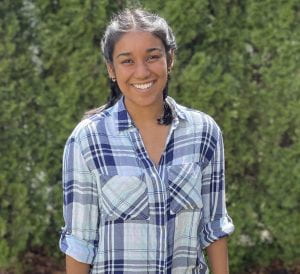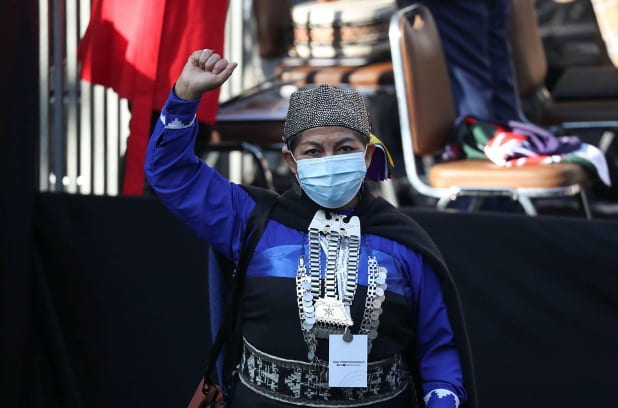
About the Author
Nithyani Anandakugan is a junior at Harvard College from Acton, Massachusetts. She is studying history with a particular interest in themes of democracy, citizenship, and civil resistance. She also writes for the Harvard International Review.
The Fragility of Democracy
A Comparative Perspective on Chile’s Political Renewal and Sri Lanka’s Democracy
My Appa immigrated to the United States in the 1980s fleeing the Sri Lankan Civil War. The ethnic conflict, which evolved into a separatist movement, represented an effort by insurgents to reclaim the Tamil minority groups’ political rights from a Sinhalese-dominated government that increasingly neglected them.
Amma left Sri Lanka years later in the 1990s. From their stories, I became keenly aware that democracy is fragile. Fundamental markers of a strong system—like equal representation and measures for accountability—can be elusive in practice. But when realized, they create a more inclusive and just society. Although the idea of democracy is quite inspiring, many democratic experiments fracture under pressure.
This past summer, my DRCLAS Remote Internship with the Instituto Milenio Fundamentos de los Datos (IMFD) in Chile expanded these lessons in democracy that I first learned from my parents’ stories. I caught promising glimpses into a democracy that is slowly mending itself.
My project at the research center revolved around Chile’s ongoing Constitutional Convention and its effort to create a more inclusive and participatory democracy. The work illuminated for me the sturdiness of the country’s democratic traditions. For instance, coronavirus surges in Chile during the early months of 2021 cast a shadow of uncertainty onto the continuity of this constituent process: due to public health concerns, the government postponed the elections to select representatives to the Convention previously scheduled for April 10 and 11. Even so, Chile’s democracy weathered the pandemic. The elections successfully ensued in May, and the Convention got underway by July 4, 2021.
Maybe part of what makes Chile’s democratic processes so enduring is the historical precedent of these democratic traditions. Indeed, the 2021 Convention is not Chile’s first. The country organized a similar effort to rewrite its Constitution in 1925. In fact, for my specific task at the IMFD, I investigated key themes and factions in the 1925 Chilean Constitutional Convention to make comparisons with the one ongoing in 2021. In doing so, I learned of the country’s immense progress within the past century.
The Assembly reflected the more diverse and inclusive Chile that it aimed to represent. Delegates at the convention elected Elisa Loncón—a Mapuche leader and scholar—as president of the Convention, a dramatic pivot from years prior. Although Chile’s Indigenous-identifying people constitute more than 10 percent of the population, the 1925 Convention lacked Indigenous representation, and the country’s most recent 1980 Constitution neglected to acknowledge the country’s Indigenous peoples. Loncón’s election reflects a movement to center historically marginalized groups in Chilean society in this ongoing Constituent Process. Indeed, the Assembly reserved 17 of its 155 seats for Indigenous representatives. Similarly, in a move toward gender parity, 77 or half of the convention’s seats are claimed by women. This dedication to Indigenous and female representation reflects signs of progress for the country and may even function as a model for the rest of the world.

Elisa Loncón raises her fist as a symbol of solidarity at the Chilean Constitutional Convention. Source: https://www.reuters.com/world/americas/protests-delay-inauguration-chiles-new-constitutional-assembly-2021-07-04/
Chile’s example also illustrates that democracy can be messy. The Convention followed a period of social discontent in Chile that began in 2019 when students took the streets to resist a price hike in public transit fares. They condemned not just increased transportation fees but decades of injustice and steep inequality that this price hike, which disproportionately affected working class Chileans, reflected. Despite the country’s strong economy and relatively sturdy democracy, Chile possesses extremely high levels of inequality.
The Piñera administration mobilized security forces to quell the resistance, sparking even more outrage at the state’s excessive reliance on military and policing power. Demonstrators recognized these actions as artifacts of Augusto Pinochet’s authoritarian regime in the 1970s-80s and the constitution his administration left behind. Protesters demanded a new constitution, and Chilean voters overwhelmingly agreed.
The dictator Augusto Pinochet claimed power in 1973 through a military junta. He introduced a neoliberal system into Chile’s economy, which has lingered until the present moment. More notoriously, though, his administration committed countless human rights abuses, including disappearing and murdering dissenters throughout the 1970s and 80s. Interestingly, it was during this same period that Sri Lanka, my parents’ home country, was embroiled in civil war. In fact, Sri Lanka’s president at the time has since been accused of committing human rights violations comparable to the ones committed under Pinochet.
Despite similar histories in the 1980s, Chile and Sri Lanka have undertaken two disparate trajectories. Sri Lanka’s conflict lasted until 2009, but even since then, the country’s democracy has faltered. Since 2019, Chile has worked to empower more of its citizens and create a more representative democracy. Conversely, Sri Lankan parliament has passed a constitutional amendment concentrating power in the executive and undermining the “rule of law.”
This comparative perspective offers yet another lesson in democracy. Fragile as they may be, democracies grow sturdier when they are backed by a strong democratic tradition. Chile’s historical Constitutional Conventions and plebiscites have set sturdy precedents for the uncertainties that the past few years have presented. Maybe with time, Sri Lanka will develop these democratic traditions too.
More Student Views
Of Salamanders and Spirits
I probably could’ve chosen a better day to visit the CIIDIR-IPN for the first time. It was the last week of September and the city had come to a full stop. Citizens barricaded the streets with tarps and plastic chairs, and protest banners covered the walls of the Edificio de Gobierno del Estado de Oaxaca, all demanding fair wages for the state’s educators. It was my first (but certainly not my last) encounter with the fierce political activism that Oaxaca is known for.
Public Universities in Peru
Visits to two public universities in Peru over the last two summers helped deepen my understanding of the system and explore some ideas for my own research. The first summer, I began visiting the National University of San Marcos (UNMSM) to learn about historical admissions processes and search for lists of applicants and admitted students. I wanted to identify those students and follow their educational, professional and political trajectories at one of the country’s most important universities. In the summer of 2025, I once again visited UNMSM in Lima and traveled to Cusco to visit the National University of San Antonio Abad del Cusco (UNSAAC). This time, I conducted interviews with professors and student representatives to learn about their experiences and perspectives on higher-education policies such as faculty salary reforms and the processes for the hiring and promotion of professors.
Post-Secondary Education Access in Peru
Over the summer, I visited four public schools in Peru located in two regions, about 1,200 miles apart from each other. I interviewed teachers, principals and high school juniors and seniors. I wanted to discover their perspectives on perceived opportunities and barriers for students to plan for and fulfill their higher education goals. I also interviewed the superintendent at each school district to learn about local initiatives aimed at decreasing barriers to higher education transition.




